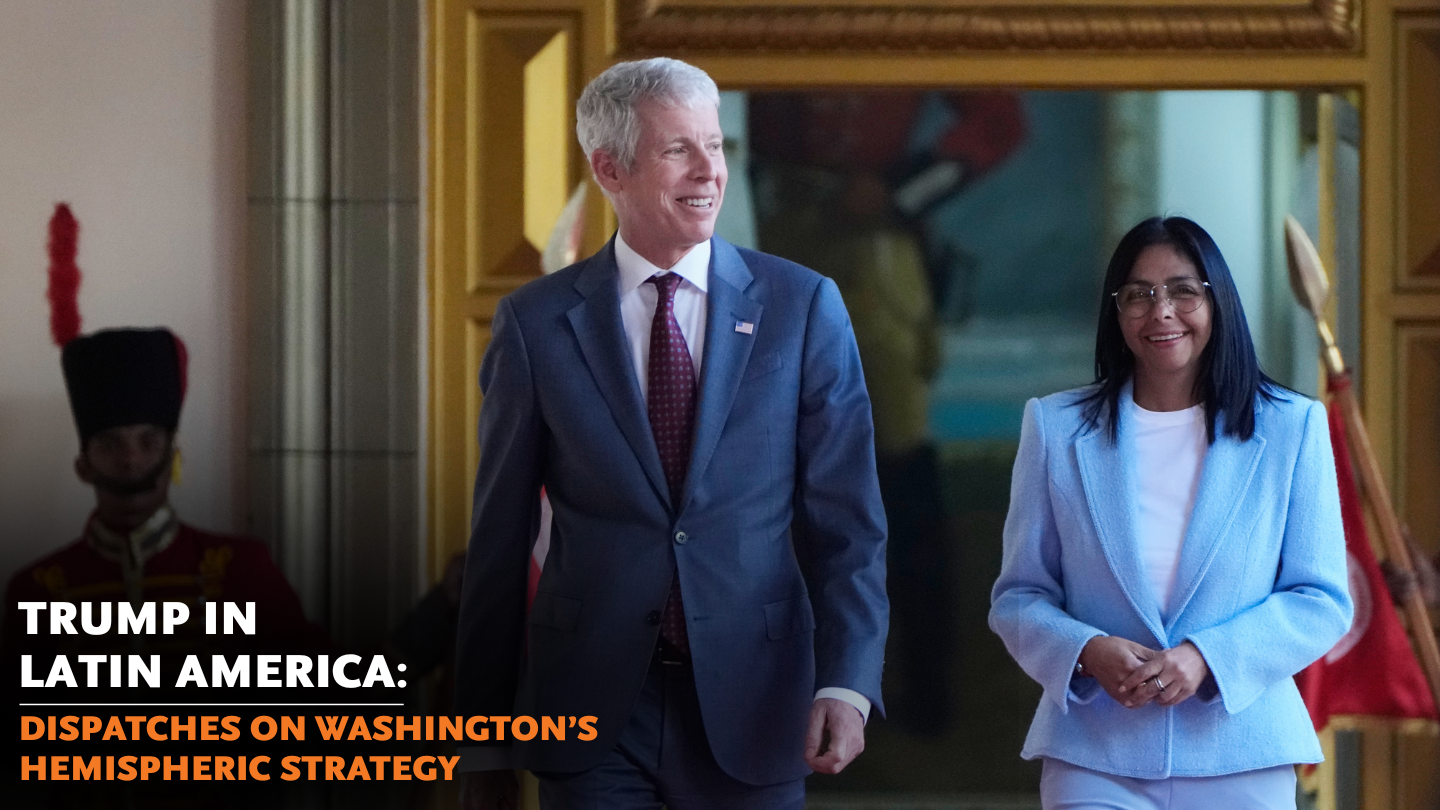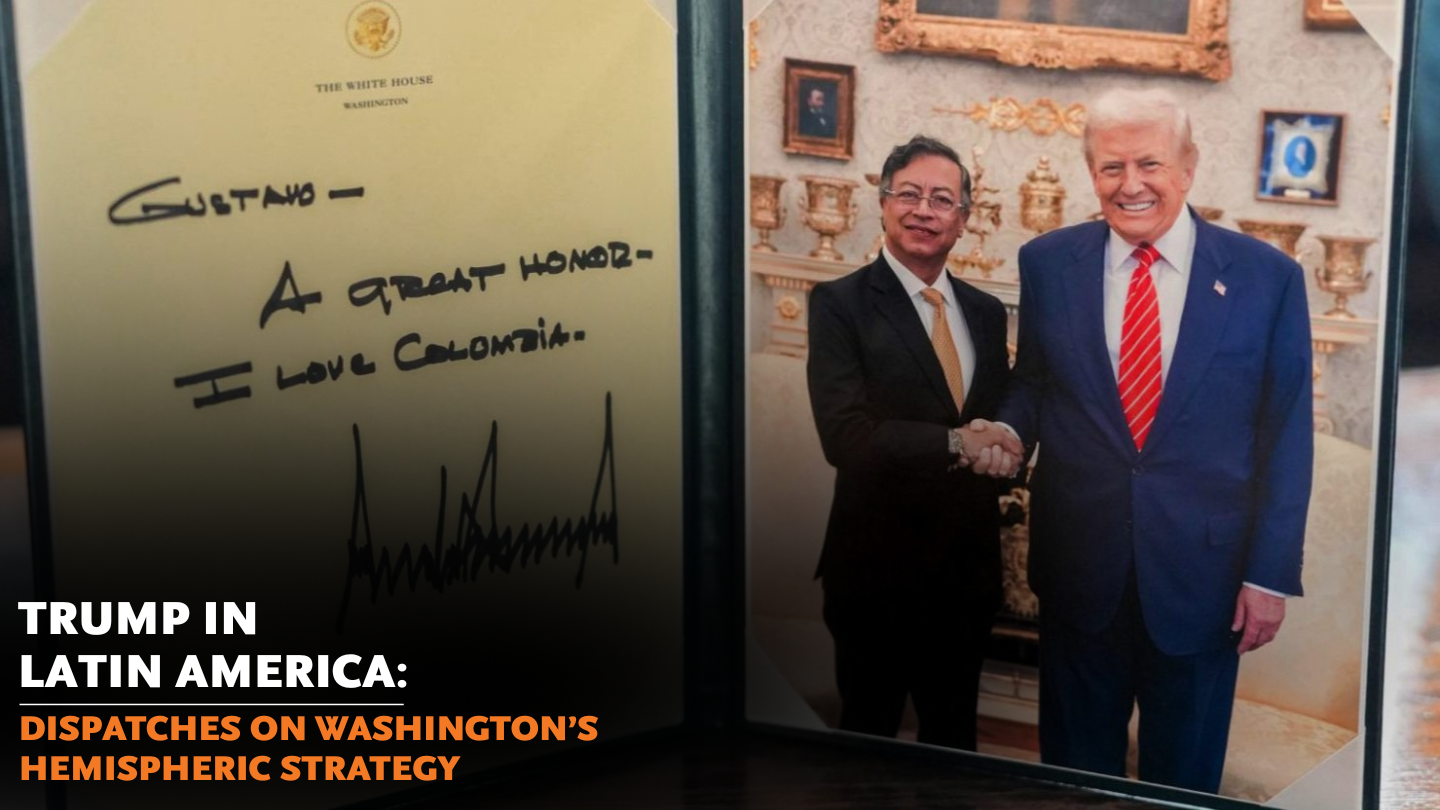Obama's Chance to Establish New Relationships in Hemisphere
Obama's Chance to Establish New Relationships in Hemisphere
Jorge "Tuto" Quiroga, former president of Bolivia, outlines a concrete working agenda for the Obama administration. Originally published in Americas Quarterly.
What a paradox! Never has the Hispanic vote been more influential in a U.S. election than in 2008 — and never has the U.S. had less regional influence than today.
That said, 200 years of history and a rising regional power (Brazil) present you, Mr. President-elect, with a unique opportunity to build a new relationship of solidarity with the region on everything from energy, aid and commerce, to security and migration.
Until five years ago, the U.S. president was the most important person on the planet for Latin America — the leader of our region's most important investor, market and lender. Remember the IMF-World Bank-IDB packages arranged by your Treasury to rescue Brazil in 1999 and 2003 and Argentina so many times? Remember the $50 billion package for Mexico in 1994? Remember the smaller countries in need of support and debt relief that required the White House's green light? Remember all the nations queuing up to follow Mexico into the North American market? The requests for bilateral investment treaties and OPIC guarantees?
Well, those days are long gone.
When a Latin American thinks today of a foreign investor, Spain, Latin American multinationals and Europe come to mind first. If the discussion is about buyers, China takes the prize. If it is about aid, many today prefer subsidized oil from the Venezuelan-state oil company, PDVSA, to cooperation from any other source. But despite appearances, this is actually an opportunity. We can now move to a more mature and pragmatic association, in which we will not be at the top of your agenda and the U.S. will not be our entire agenda.
As president, you can change how our hemisphere is viewed. You can discard the "anti" perspective (anti-communism, anti-terrorism and anti-narcotics) and finally encourage your nation to view us through pro-American (hemispheric-American) eyes.
It is on this basis that we should move forward on a hemispheric agenda.
What should be on that agenda? Let's skip the generic lectures about rule of law, inequality, human rights, or other very worthy in-country topics that prevent us from engaging in cross-border hemispheric issues. Let us focus instead on a concrete working agenda that should include, at a minimum, migration, energy and climate change, trade/aid and crime.
On migration: Seize the opportunity provided by the atrocious European Union (EU) directive that criminalizes migration, detains our citizens and separates them from their families. The time is ripe to undertake comprehensive migration reform. Do it for your economy. Do it for universal human rights. Show the world that you will not follow Europe's example.
If our Latino sisters and brothers can come out of the shadows, we can unleash the biggest development program in the region: the capitalization of the $60 billion in remittances sent to Latin America. Today these remittances are mainly charity that trickles through Western Union and ends up as consumption of goods and services. With the convergence of debit-prepaid systems, cell phones and micro-financial institutions, we can register migrants, bank them as legal residents and capitalize the money they send our way for housing, business and infrastructure development. This alone would become the best, most democratic, purely private, poverty-targeted development program for millions of our citizens.
On energy: Add all the wind, sun, oil, gas and sugar in the hemisphere and strive for hemispheric energy self-reliance. We can, within a decade, build a hemispheric electrical grid, develop all our renewable sources, establish effective taxes on carbon that will lower emissions, and create Pacific and Atlantic LNG (liquefied natural gas) biofuel "belts."
The hemisphere will then have a cleaner environment, secure access to energy and healthier democracies that do not fall prey to petro-tyrannies. But to do this, you must eliminate the 54-cents-a-gallon tariff on our sugar ethanol and the $1.90 a gallon subsidy on your corn ethanol.
On trade and aid: On this we can all follow the EU example. A pure hemispheric free-trade agreement will go nowhere. To make it work, start with the environmental and labor provisions added to the Peru-U.S. trade agreement and match this with a daring proposal.
Latin America has some of the largest infrastructure development gaps in the world. Guatemala and Mexico are worlds apart, Bolivia and Brazil even more so.
So, borrow a page from Europe's playbook and add all your different aid funds, double them, place them in the Inter-American Development Bank, and challenge all countries to ante up their proportional share to support infrastructure development with greater resources devoted to our small brothers in the region.
And — oh yes! — ask Congress to approve the Colombia Free Trade Agreement before 2008 ends. It would restore bipartisanship to trade, send a clear signal to the region and support Colombia, which has been under siege from the cocaine-funded FARC and the petroleum-funded Government of Venezuela. (Both addicting, environmentally damaging products which, ironically, have "duty-free access" to the U.S. market.)
On crime: We must develop a comprehensive, region-wide program to reduce the demand and production of drugs and tackle gangs. It is fine to have a Plan Colombia and a Plan Mérida, but where are the New York, Los Angeles, São Paulo, and Buenos Aires plans? On this we can join hands and make progress.
Now, how can we implement the agenda? By disregarding sideshows and concentrating on what is important. Just 20 days before your inauguration the Cuban Revolution will turn 50. It will be quite a New Year's Day party and farewell, full of walking canes and old memories. The keynote speaker will be the one who now provides Cuba's lifeline through oil. President Chávez will give a long-winded speech reminiscing about the glorious revolution, which by now he has retroactively purchased.
Ignore it.
Instead, look 200 years back and a few thousand miles to the south. A few months after you are sworn in, several countries will celebrate the bicentennial of our first Gritos Libertarios that marked the beginning of the end of Spanish colonial rule. This celebration will last a few years and it begins the same year as your presidency. It will also mark the end of the beginning of the next 200-year ascendancy of a regional and worldwide behemoth: Brazil, which holds the promise of India with oil and biofuels or Russia without autocracy and nukes.
History and partners are as important as the content of a well-crafted set of hemispheric proposals. So engage with Brazil and change the acquaintance into a strong partnership. Hold yearly gatherings of the North American Free Trade Agreement countries plus Brazil, discuss U.N. Security Council access, World Trade Organization agreements, biofuels and all the elements of the hemispheric agenda. The U.S.-Brazil alliance would create an irresistible positive axis in the hemisphere.
You will be busy during the classic first 100 days of your administration. But Latin America needs just two of those 100 days. You will spend a day and a half in April at the Summit of the Americas in Trinidad and Tobago.
To make this a productive event, invest half a day a few weeks before and get together with the leaders of Brazil, Canada, Mexico, and a few others, and ask them to jointly draft a blueprint for the "Bicentennial Agenda for the Americas" to be presented and approved at the Summit.
We know most of our hemispheric issues are hard. And making headway on many of them will mean bringing along the speaker of the House and at least 60 senators. But over the long-term, it will be more damaging to disengage and let tension, polarization and acrimony take over the Americas.
Finally, Mr. President-elect, you understand how much symbols and rhetoric matter in regional affairs. It is difficult in today's high-tech age to persuade us that hemispheric integration requires a physical fence. Perhaps you can channel Presidents Kennedy and Reagan as they stood next to another wall and issue your own declaration of solidarity: "Ich bin ein Americano: North, South, Central, and Caribbean Americano; I will tear down this wall along the Rio Grande."
That may be asking for too much, but we will settle for "My fellow South, Central, Caribbean, and North Americans, together we will build an integrated America, from the North to the South poles, through a comprehensive Bicentennial Agenda for the hemisphere's sustainable development."
It's a bit more wonkish, a tad less dramatic, but good enough.
Quiroga was president of Bolivia and currently leads the opposition party in Congress. This article is reprinted with permission from the Fall 2008 issue of Americas Quarterly (www.americasquarterly.org). It is the second in a four-part series of Americas Quarterly articles with messages from other Western Hemisphere leaders for Barack Obama.








